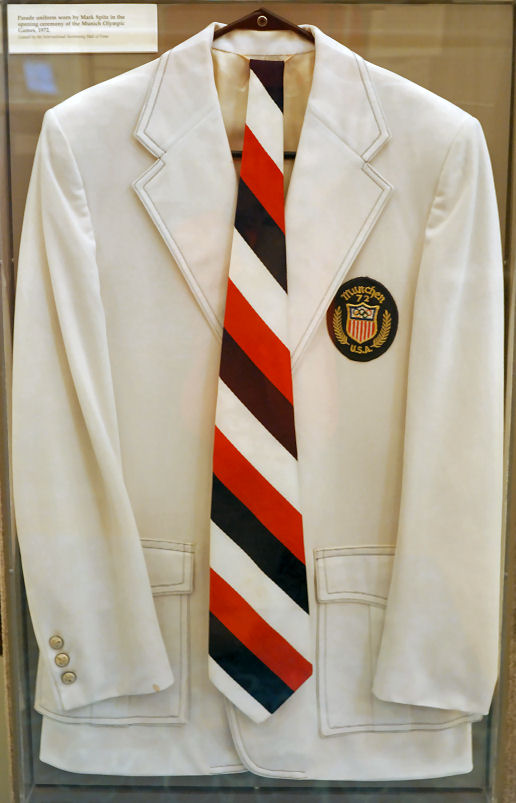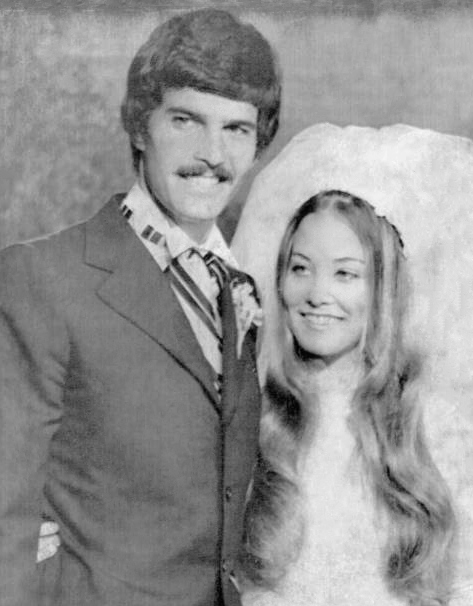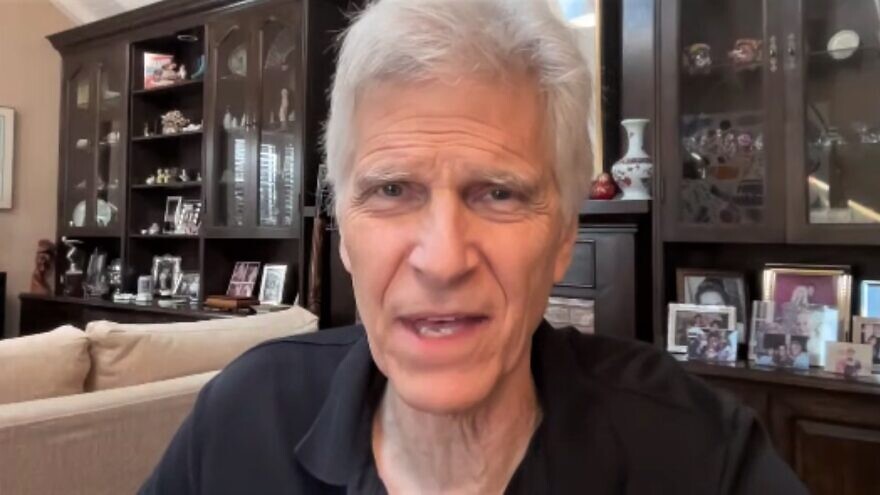Fifty years after the 1972 summer Olympics in Munich, swimmer Mark Spitz is still a household name and a Jewish legend. He is best known for winning seven gold medals in the 1972 games. This achievement lasted for 36 years until it was surpassed by fellow American swimmer Michael Phelps, who won eight golds at the 2008 Summer Olympics in Beijing.
Spitz, a father of two sons, humanitarian, businessman/entrepreneur, television personality, motivational speaker and “almost dentist,” was recently honored by the Israel Guide Dog Center in Israel. The Los Angeles resident shared stories from his illustrious career at a Zoom event that also featured Achiya Klein and his guide dog, Night; Kline recently competed in the 2021 Tokyo Paralympics.
The center, based in Beit Oved, about 14 miles south of Tel Aviv, raises and trains guide dogs for Israelis 24,000 blind and visually impaired citizens.
Spitz recounted some of the behind-the-scenes, emotional story of the storming of the Olympic Village apartments of Israeli athletes by Palestinian terrorists in the early morning of Sept. 5, 1972. Two Israelis were immediately killed and nine others taken hostage by a group known as Black September. After hours of negotiation and an attempted getaway by helicopter, the world learned that all 11 were, in the words of ABC Olympics announcer Jim McKay, “all gone.”
He also shared sometimes humorous stories about where his medals—and his Olympic bathing suit—are kept (the medals are in a bank vault; the bathing suits are on display in his home). And, of course, he spoke about his famous trademark mustache, which he no longer sports, and about why people (incorrectly) think that he is a dentist.
“I am the most famous dentist who never became a dentist,” noted Spitz playfully. “Don’t come to me with a toothache!”
Spitz explained how he had planned to go to dental school after his swimming career (his signature strokes are freestyle and butterfly) and actually attended during the 1972 Olympics. He attributes his not returning to dental school in part to the massacre of the 11 Israelis.
Spitz recounts, “Two-and-a-half weeks after the last event in 1972, I was supposed to be on a plane to Indianapolis for the Indiana University dental school. The tragedy sidelined my plans. I elected to go home to Sacramento and ask the dean for a one-year leave of absence. I had the intention to go back but never made it.”
Spitz still clearly remembers the tragedy that took place in the same Olympics where he broke seven world records.
“They had just finished a documentary. I describe how I got out of the Olympic Village.” Spitz left Munich early and was escorted to London out of concern that Spitz, who is Jewish, might become a target for the Palestinians.

Spitz is proud of being Jewish, saying he and his two sisters were the only Jewish students in his California high school. “I advocate that when you get picked on, you allow it to happen. It can’t be escalated when you don’t put on a face.”
He is also a longtime supporter of the Jewish state, using the country and its citizens as an example: “Israel wouldn’t exist if she was timid. Everyone wants to bully Israel.”
His experiences at the 1972 Olympics solidified his feelings about being Jewish. Competing in Germany, “we were five or 10 miles away from Dachau. What better time to stand up for who we are?”
He added, “I never bargained for becoming a de facto spokesman for being Jewish, but I couldn’t hide under a rock!”
‘We affect the lives of so many’
Spitz, who also won two medals in the 1968 Olympics in Mexico City, retired from competition at age 22. He attempted an unsuccessful comeback at age 41 for the 1992 Summer Olympics.
His career has taken him through many interesting and successful ventures. In the years following the Olympics, he appeared in various ads (in a bathing suit, with his medals); in various TV skits, commercials (he was in an ad for the California Milk Advisory Board as well as for Schick razors and PlayStation); and worked for ABC Sports.
He has also been involved in a number of business ventures. “I had a product line of swimsuits was a co-partner with Adidas shoes; was a real estate developer, involved in the stock market, started a public company that was on the NASDAQ and have always stayed busy in the charity world.”
Spitz is an academy member of Laureus Sport for Good, a global charity that uses sports as a powerful and cost-effective tool to help children and young people overcome violence, discrimination and disadvantage in their lives. “The reward is that we affect the lives of so many who wouldn’t have a chance,” he said.
Spitz offered his audiences hope and inspiration and often uses humor. “Things don’t happen by chance, but by decisions we make, so challenge yourself. You may fall down, but it is how well you get up … it is never too late to be the person you thought you could be and continue to want to be.”
On swimsuits and swarthy mustaches
In Spitz’s quest towards personal growth and self-improvement, he noted that he recently lost 35 pounds. “Now, I am within two pounds of my weight at age 22, when I swam!” (In fact, he just may fit into that famous bathing suit he wore in the 1972 Olympics.)
“I wore the same suit in all seven events!” he reported, offering the somewhat humorous, embarrassing backstory. “They issued three suits per event, so I had 21 suits. But 20 had a revealing spot in front, so I chose to do all of the events in one suit.”

Spitz also shared the famous story of his mustache, which he said he “grew out of spite.”
It started when a college coach said he couldn’t. “I grew it after senior year of college, and it took five months to fill in.”
He noted that he had planned to shave it off at the Olympic trials, but all everyone did was talk about it.
The media began asking questions, and the Russian coach asked him if it slowed him down. Spitz replied: “No, as a matter of fact, it deflects water away from my mouth, allows my rear end to rise and makes me bullet-shaped in the water, and that’s what had allowed me to swim so great. Within a few weeks, all Russian swimmers had mustaches!”
Spitz shaved off his mustache on Valentine’s Day in 1988. His wife of 48 years, Suzy (née Weiner), reportedly said: “He looked great with it; don’t get me wrong. But he also looks so handsome without it.”
(Spitz pointed out that he didn’t like seeing his mustache as it started to turn gray.)
Still, he looks belie his 72 years, and the Jewish athlete is still going strong and continuing to inspire audiences around the world.


























